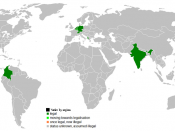The field I would like to concentrate on is medicine. To narrow it even further down, I will write about euthanasia. The dictionary definition for euthanasia is: the act of putting to death painlessly or allowing to die, as by withholding medical measures from a person or animal suffering from an incurable, painful disease or condition. In other words it is mercy killing. These days euthanasia is a very controversial and also very complicated topic for society. It is so complicated that it already got the government involved to make the final decision about its existence. I would like to provide an example on which I will further base my assumptions and dilemmas.
There is a 40-year-old woman who suffers from one of the worst diseases. She is paralyzed from her neck down. The woman cannot talk nor communicate. She does not function in any way normally. She does not eat, drink nor is in any way on her own.
The woman is in constant pain. None of the medications are helping. She needs constant attention. The only thing that is still working properly is her brain. She begs the government to ease her pain. The only way to do that is to perform euthanasia on her. The woman wants her husband to inject her the poison. She wants it. She needs it. She cannot go on living like that anymore. She knows that there is no possibility for her to get better or to get well. She knows that it can only get worse. She wants to die in dignity.
The government says "no" and they base their decision on morality. They also warn her that if her husband will do it he will get 20 years of prison for a murder.
The first question here is: what is moral? In the dictionary moral means: pertaining to, or concerned with the principles of right conduct or the distinction between right and wrong. In other words moral is the right conduct, the right thing to do and immoral is the bad conduct and the bad thing to do. Who decides what is moral and what is not? Well, I would say that it starts with the people who are not really involved in the specific case but who just do not like it. From there it goes through the whole process of organizing supporting groups, and finally getting to the officials and government. Those people however mostly are not directly affected by the moral case. Let now start our analysis.
Is it moral for the woman to ask for euthanasia? In other words, is that the right conduct? The woman is incurably sick. Lets assume that that woman never let anybody to take care of her. She took care of everything and everybody. Now she cannot even wash herself. That is not the worst part; the worst part is that the pain that she is in never stops. Her brain is still working and that is why she sees the trouble that she puts everybody around her in. She feels guilty. That is not the worst part either, she feels humiliated because she has no control of any aspect of her life.
Is it moral for her husband to perform euthanasia on her? What is the right conduct? Her husband loves her. Every minute of every day he sees how much she suffers. He knows that he cannot help her in any way. He wishes he could do something to make the pain stop. He would do anything to stop the suffering of a person that he cares so much for. Seeing her in this condition kills him inside. Finally she tells him about being free of the pain and humiliation. She tells him about dying with dignity. She asks him to give her the final say about her life. Is it moral for a government to decide what is right for her? How do they judge the right conduct? Killing is always killing for the government. They do not have time to get into the details of any aspects of the given person's life. Sorry, but there are too few people who want to have euthanasia performed on and they are not getting any chances with the rest of the population. You have unbearable pain and suffering? Well that is life what are you going to do? You have to learn to live with it. The problem is they do not put themselves in the victim's positions. They never kill. The wars, the death penalty this is how the world works. Nevertheless the world does not kill the people who want to and beg for death to ease the unbarring suffering. The government knows the right times, the better ways, the right ways to die with dignity. Go to war, die for your country, die for the liberty, die for religion, die for the person you care for, never die just for your peace and sake. This is immoral.
Is it moral for the woman to press her husband for it and get him in jailed afterwards? She is so desperate that she just cares about her relief. Her care reaches the point when she dies and that is it. I really cannot say if this is the right conduct. When she would do that that would mean that she puts her needs above his. I think that approach would suggest that she unconsciously thinks that when her suffering will end so will his. On the other hand if he really loves and cares for her, it really should not matter what happens to him, he should concentrate on what happens to her.
Is it moral for anybody to say what is right way to die? Is it right to decide about somebody's life? Is it right to make that decision not knowing how it is to be in this person's position? The only fair way to make that decision would be if those people with that kind of authority were given for a period of time the same pain and suffering, the same deformity the same life as the people whose life depends on their decision.





